Kaist
Korean

Announcements
College of Engineering Notice
-
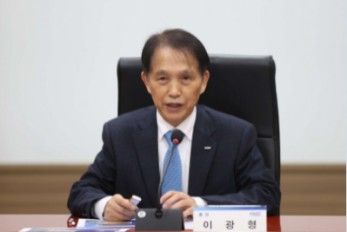
President Lee Presents Plans to Nurture Next-Generation Tale..
President Lee stressed that nurturing physician-scientists, semiconductor R&D personnel, startup entrepreneurs, and global innovators are key missions he will continue to pursue during a news conference < President Lee holds a news conference marking the 1st anniversary of him becoming the president on February 15. > KAIST President Kwang Hyung Lee said that nurturing physician-scientists, semiconductor R&D personnel, startup entrepreneurs, and global innovators are key missions he will continue to pursue during an online news conference marking the 1st anniversary of him becoming the president on February 15. He said that nurturing physician-scientists is the most critical mission for KAIST to help the nation create a new growth engine. He said KAIST will help the nation drive the bio-industry and provide medical science resources for the nation’s health sector. To this end, he said that KAIST will open its Medical Science and Technology School by 2026. “We plan to expand the current Graduate School of Medical Science and Engineering into a new Medical Science and Technology School that will focus entirely on a condensed MD-PhD course converging the fields of AI, bio, and physics,” he said. The school aims to foster MD-PhDs whose research results will eventually be commercialized. He said that the university is now discussing revisions to related laws and regulations with the government and other universities. To supply human resources to the semiconductor industry, President Lee said the university will add a campus in Pyongtaek City that will serve as an advanced convergence research hub in the field of next generation semiconductors in collaboration with Samsung Electronics and the city of Pyongtaek. The three-stage opening plan projected the final opening of the campus by 2036. During the first stage, which will be completed by 2026, it will construct the campus infrastructure in Pyongtaek city where Samsung Semiconductors runs two massive semiconductor complexes. By 2031, it plans to launch the open research platform including a future cities research center and future vehicles research center. The campus will open the global industrial collaboration cluster hub by 2036. In the global arena, President Lee said he is working to open the New York campus with stakeholders in the United States. He announced the plan last December that was endorsed by New York-based entrepreneur Hee-Nam Bae, the chairman of Big Continent Inc. President Lee and Chairman Lee signed an MOU for the funding to open the campus in New York. “We are discussing how to facilitate the plan and best accommodate the interests and potential of our students. Many ideas and plans are on the table and we think it will take longer than expected to finalize the plan,” explained President Lee. However, he added that the basic idea is to offer art tech and health technology programs as well as an AI-based finance MBA at the New York campus, in addition to it serving as the startup accelerator of KAIST. President Lee stressed the importance of technology commercialization when successfully launching KAIST Holdings last month to help spinoffs of KAIST labs accelerate their end results. He said that KAIST Holdings will build a virtuous supporting system to commercialize the technology startups coming from KAIST. “We plan to list at least 10 KAIST startups on the KOSDAQ and two on the NASDAQ by 2031. KAIST Holdings also aims to nurture companies valued at a total of one billion KRW and earn 100 billion KRW in technology fees by 2031.
-
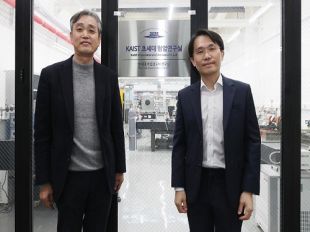
Thermal Superconductor Lab Becomes the 7th Cross-Generation ..
< Senior Professor Sung Jin Kim (left) from the Department of Mechanical Engineering will team up with Junior Professor Youngsuk Nam for the 7th Cross-Generation Collaborative Lab, the Thermal Superconductor Lab > The Thermal Superconductor Lab led by Senior Professor Sung Jin Kim from the Department of Mechanical Engineering will team up with Junior Professor Youngsuk Nam to develop next-generation superconductors. The two professor team was selected as the 7th Cross-Generation Collaborative Lab last week and will sustain the academic legacy of Professor Kim’s three decades of research on superconductors. The team will continue to develop thin, next-generation superconductors that carry super thermal conductivity using phase transition control technology and thin film packaging. Thin-filmed, next-generation superconductors can be used in various high-temperature flexible electronic devices. The superconductors built inside of the semiconductor device packages will also be used for managing the low-powered but high-performance temperatures of semiconductor and electronic equipment. Professor Kim said, “I am very pleased that my research, know-how, and knowledge from over 30 years of work will continue through the Cross-Generation Collaborative Lab system with Professor Nam. We will spare no effort to advance superconductor technology and play a part in KAIST leading global technology fields.” Junior Professor Nam also stressed that the team is excited to continue its research on crucial technology for managing the temperatures of semiconductors and other electronic equipment. KAIST started this innovative research system in 2018, and in 2021 it established the steering committee to select new labs based on: originality, differentiation, and excellence; academic, social, economic impact; the urgency of cross-generation research; the senior professor’s academic excellence and international reputation; and the senior professor’s research vision. Selected labs receive 500 million KRW in research funding over five years.
-

KAIST and KNUA to Collaborate on Culture Technology
Distinguished Visiting Scholar Soprano Sumi Jo Accompanied by AI pianist ‘VirtuosoNet’ during the Special Concert at KAIST KAIST will expand the convergence of arts education and culture technology research in collaboration with the Korea National University of Arts (KNUA), the nation’s top arts university. KAIST President Kwang Hyung Lee signed an MOU with President Daejin Kim of the Korea National University of Art on January 6 at KAIST’s Daejeon campus for collaborations in arts education and research. KAIST and KNUA will expand educational programs such as student exchanges and co-credit programs. The two universities will team up for cooperation focusing on research centers and academic conferences for the creation of culture technology and convergence arts. Minister of Culture, Sports, and Tourism Hee Hwang also attended the ceremony. Minister Hwang said that the Ministry will invest 132 billion KRW in R&D for developing metaverse and content technologies. He added that this collaboration will be a very meaningful turning point for creating a new culture combining high-level technologies. President Kim also expressed his expectations saying, “The collaboration of our two universities will generate a huge synergistic impact for nurturing talents and the creation of convergence arts. President Lee said that the collaboration with KNUA will take KAIST another step forward as it aims to foster well-rounded talents. “We look forward to proactive collaborative research that will expand the new chapter of convergence arts and future stage performances.” Right after the signing ceremony, world renowned soprano Sumi Jo, who was named a Distinguished Visiting Scholar, took the KAIST auditorium stage for a special concert. AI pianist ‘VirtuosoNet’, developed by Professor Juhan Nam at the Graduate School of Culture Technology, made its debut at the concert by playing Mozart’s Turkish March arranged by Arcardi Volrodos. VirtuosoNet also accompanied Soprano Jo on one of her songs. The concert by Sumi Jo and AI pianist VirtuosoNet heralds what KAIST is pursuing for education and research in culture technology. The Graduate School of Culture Technology plans to conduct research on future culture industries combined with technologies for the metaverse. The Sumi Jo Performing Arts Research Center will conduct research on performing technologies together with virtual artists. Head of the Graduate School of Culture Technology Woontack Woo said that KAIST will expand the sphere of the culture industry including tourism in collaboration with KNUA by incorporating technology into arts.
-
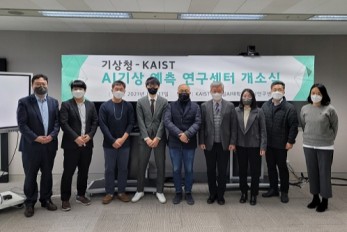
The Kim Jaechul Graduate School of AI at KAIST founds an AI ..
The Kim Jaechul Graduate School of AI and the National Institute of Meteorological Sciences (NIMS) under the National Meteorological Administration founded an AI weather forecasting research center (head: Prof. Seyoung Yoon). The KAIST AI weather forecasting research center was established under the Kim Jaechul Graduate School of AI at KAIST as it was selected as the final contractor of the AlphaWeather development research project funded by the National Institute of Meteorological Sciences. The AlphaWeather is an AI system that utilizes and analyzes about 150 thousand pieces of weather information per hour to support weather forecasters to produce accurate weather forecasts. The research center is composed of three research teams with the following goals: (a) Development of AI technology for precipitation nowcasting, (b) Development of AI technology for accelerating the physical process-based numerical models, and (c) Development of AI technology for supporting weather forecasters. The teams consist of 15 staffs from NIMS and 61 researchers from the Kim Jaechul Graduate School of AI at KAIST. The research center is developing an AI algorithm for precipitation nowcasting (with up to six hours of lead time), which uses satellite images, radar reflectivity, and data collected from weather stations. It is also developing an AI algorithm for correcting biases in the prediction results from multiple numerical models. In addition, it is developing AI technology that supports weather forecasters by standardizing and automating repetitive manual processes. After verification, results obtained will be used for the Korean National weather service as a next-generation forecasting/special-reporting system intelligence engine from 2026.
-
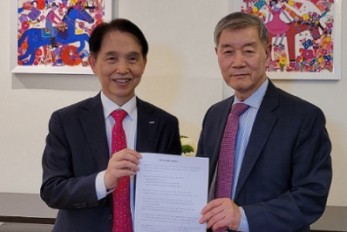
KAIST Plans to Open a New York Campus
President Lee signs an MOU with New York-based Big Continent Inc. Chairman Hee-Nam Bae on funding the New York campus < President Lee (left) and Chairman Bae pose after signing an MOU to open a New York campus last week. > President Kwang Hyung Lee announced a plan to open a KAIST campus in New York with funding from New York-based entrepreneur Hee-Nam Bae. President Lee and Big Continent Inc. Chairman Hee-Nam Bae signed the MOU last week for the funding to open the campus in New York. President Lee said it will take years to open up a campus in New York in order to conform with both Korean and US legal procedures. However, during a news conference in New York following the signing of the MOU with Chairman Bae, President Lee said this is the first step toward realizing KAIST’s new vision of a ‘Global Twin Strategy’ by making New York KAIST’s newest stronghold to target both domestic and global markets. “New York is the center of the world’s commerce, culture, and new technologies. If we want to grow big, we should go to one of the biggest cities in the world and New York is the place. I highly encourage our students and faculty go into the world and never be satisfied enjoying the top position in Korea. The next place to investigate will be Silicon Valley,” said President Lee. “We still have many issues to resolve domestically. We need to discuss more details first with the Board of Trustees and the Korean government,” he added. The New York campus will aim to become an enterprise-type university to help KAIST create global value. Our goal is to make sure that Korean businesses gain competitiveness in the global market and can become listed on the NASDAQ. “We plan to open majors related to AI, financial engineering, and cultural technologies. We will recruit students from both the US and KAIST to study at our New York campus.” President Lee said. Chairman Bae, a self-made entrepreneur who immigrated to the US in 1981, also leads the Global Leadership Foundation in the US. “President Lee and I have already toured several candidate sites for the campus in the New York region and we will make a final decision on the best site to purchase,” said Chairman Bae. Chairman Bae added that he has always dreamed of fostering young global talents who will take on global challenges with pioneering minds. He believes KAIST shares this global vision. The New York campus will be the first KAIST campus for global students funded by someone from the private sector. This is also a major step forward for KAIST, which was founded by a six million dollar USAID loan in 1971. KAIST announced its plans to establish Kenya KAIST in 2018 with funding from the Korea Eximbank’s 95 million USD development cooperation fund loan to the Kenyan government. KAIST will provide turn-key-based education consultancy featuring curriculum design and the construction of facilities for Kenya’s first advanced science and technology institute. The campus will be located in the Konza Techno City near Nairobi and plans to open in 2023.
-
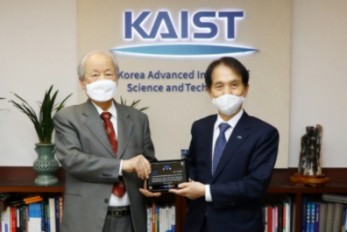
A Judicial Scrivener in His 90s Donates to AI Research
Dong-Myoung Kim donated 2 billion KRW to fund the Kim Jae-Chul AI Graduate School < President Lee (left) poses with Dong-Myoung Kim who donated 2 billion KRW to KAIST during a ceremony on December 6. > Dong-Myong Kim, a 90-year-old resident living in Seongnam City in Kyonggido made a gift of 300 million KRW in cash and property valued at 1.7 billion KRW to fund the Kim Jae-Chul AI Graduate School. KAIST President Kwang Hyung Lee and a senior leadership team warmly received Kim during the donation ceremony on December 6 and delivered a plaque of appreciation. Kim, a certified judicial scrivener, sent a letter regarding his intention to donate to the KAIST Development Foundation Office in October. Development foundation officers contacted him for a meeting and presented the major achievements of KAIST and new vision for the future during the meeting. After meeting with KAIST officials, Kim completed all the legal procedures for donating such as handing over the title of his property. A Development Foundation official said that Kim was well aware of what KAIST has achieved and is doing now. “He had already searched KAIST’s website and scrutinized what we are doing now. He was clear about his intentions,” said the official. Kim said that media news reports on the recent series of huge donations to KAIST inspired him. “I thought there was something special behind the donors’ intention to make such a decision.” Kim said the studies on futurism he started in the 1980s led him to become interested in new technologies. “I firmly believe that KAIST will make huge contributions to the nation and our society through advances in science and technology. It is said that the joy of giving is much larger than that of receiving. I am now experiencing such immense joy. I will be even happier if KAIST can lead the nation through its AI research.” President Kwang Hyung Lee said Kim’s letter of intention touched him deeply. He thanked Kim, saying that the entire KAIST community will make every effort to respond to Kim’s donation wishes.
-

Renault 5 EV and Canoo’s Pickup Truck Win the 2021 FMOTY Awa..
KAIST Future Mobility of the Year Awards recognize the most innovative concept cars of the year < Renault 5 EV and pickup truck from the US startup Canoo(right) > The Renault 5 EV from France and a pickup truck from the US startup Canoo won the 2021 Future Mobility of the Year Awards (FMOTY) hosted by the Cho Chun Shik Graduate School of Green Transportation at KAIST. The awards ceremony was held at Renault Samsung Motors in Seoul on November 25. KAIST began the FMOTY in 2019 to advance future car technology and stimulate growth in the industry. The award recognizes the most innovative ideas for making the most futuristic concept car and improving the technological and social value of the industry. The awards ceremony was attended by KAIST President Kwang Hyung Lee, the dean of the Cho Chun Shik Graduate School of Green Transportation In Gwun Jang, CEO of Renault Samsung Motors Dominique Signora, and CEO of Canoo Tony Aquila. President Lee said, “The new world order will be impacted by new technology developers who envision the future. Their innovation and creative ideas will open a new world of sustainable future transportation.” Out of the 46 concept cars revealed at global motor exhibitions between last year and the first quarter of this year, models demonstrating transport technology useful for future society and innovative service were selected in the categories of passenger cars and commercial vehicles. Sixteen automotive journalists from 11 countries, including the chief editor of Car Magazine in Germany Georg Kacher and editorial director of BBC Top Gear Charlie Turner, participated as judges. This year’s award for the best concept car for a passenger vehicle went to an electric vehicle, the Renault 5 EV. The compact electric car was highly regarded for its practicality and environmental friendliness. A pickup truck by Canoo, an American EV manufacturing start-up, won the award in the commercial vehicle category. The pickup features an innovative design allowing for a variety of functions topped with a competitive price and it received overwhelming support from the judges. While Hyundai Motors swept both prizes at the awards last year and demonstrated the potential of Korean concept cars, Canoo’s win in the commercial vehicle section as a young American venture company brought attention to the changing dynamics in the automotive market. This shows that young EV start-ups can compete with existing car companies as the automotive paradigm is shifting from those with internal combustion engines to EVs. The awards organizers said that the Cho Chun Shik Graduate School of Green Transportation will continue to hold the FMOTY to lead the fast-changing global mobility market. For more information, please visit www.fmoty.org. < President Kwang Hyung Lee (right) and CEO of Renault Samsung Motors Dominique Signora >
-
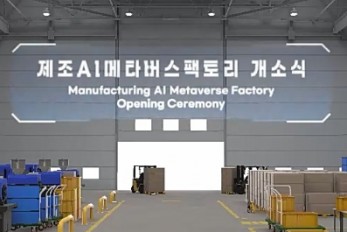
Metaverse Factory Center to Improve SME’s Competitiveness
The center is expected to enhance the manufacturing competitiveness of SMEs and root industry < A plastic bolt manufactured at the Metaverse Factory Center which opened on November 1 at KAIST in collaboration with Digiforet. > KAIST opened the ‘Metaverse Factory Experience Center for Manufacturing AI’ on November 1 at the KAIST Bigdata Center for Manufacturing AI. The AI-powered manufacturing metaverse factory will provide real-life experiences for the analysis and application of manufacturing data. Funded by the Ministry of SMEs and Startups, the center is a collaboration with Digiforet, which donated the software system to KAIST. The center allows users to experience the collection, analysis, and utilization process of manufacturing data equivalent to that of real manufacturing sites. Users can connect to the service from anywhere in the world using AR/VR/XR equipment and a metaverse solution, which allows small and middle-sized domestic manufacturing companies to overcome the challenges of entering and selling their production lines overseas in the post-COVID-19 era. The platform is an opportunity for such companies to introduce and export their excellent manufacturing techniques. With the same manufacturing and AI processes of real production sites, the injection molding metaverse factory for plastic screw production runs simulations of the products they will make. Based on the data collection parameters (temperature, pressure, speed, location, time, etc.) built into the Korea AI Manufacturing Platform, an AI-powered SME manufacturing platform, the metaverse factory can detect causes of defects, provide analysis, and guide improvements in productivity and product quality. Starting with the injection molding equipment metaverse factory, the platform aims to expand into plating, welding, molding, casting, forging, and annealing, and become a root industry to contribute greatly to enhancing the manufacturing competitiveness of Korea’s small and middle-sized root industries. Il-Joong Kim, head of the KAIST Manufacturing AI Bigdata Center where the metaverse factory is located, said, “To successfully incorporate manufacturing AI into production sites, it is indispensable that various AI algorithms are tested to optimize decisions. The platform allows users to collect manufacturing data and to experience and test AI analysis simultaneously without interrupting the production process, making it highly effective.” KAIST President Kwang Hyung Lee said, “We will support the close academic-industrial cooperation with Digiforet such as this collaborative for improving SMEs’ competitiveness.” Digiforet CEO Sunghoon Park, who donated a whole HW/SW interface for the construction of the Metaverse Factory Experience Center for Manufacturing AI, said, “I will do my best to realize the best “Metaverse Factory for Manufacturing AI” in the world by combining the AI and bigdata accumulated at KAIST and Digiforet’s XR metaverse technology.” < President Kwang Hyung Lee (far left) and participants at the opening ceremony of the Metaverse Factory Experience Center give a demonstration wearing the AR kits. >
-
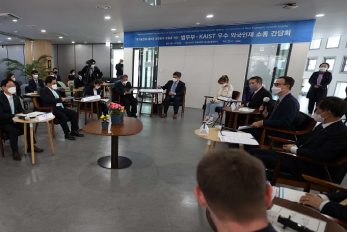
Minister of Justice Meets with KAIST International Community..
The Office of Immigration Service in Daejeon will dispatch On-Site Immigration Service Team at the campus once a week < Minister of Justice Beom Kye Park met with international students and faculty members on October 29 at the campus to discuss immigration difficulties. > Minister of Justice Beom Kye Park met with international students and faculty members on October 29 at the KAIST campus and promised the government’s prompt and flexible revision of the process for acquiring legal residency and Korean citizenship for talents in the fields of science and technology. During the meeting to discuss immigration difficulties with foreign students, researchers, and faculty at KAIST, many KAIST international students expressed their wishes to continue their research in Korea after graduation and asked for legal support to acquire permanent residence status. International faculty members including PhD and Master’s candidate and postdoc fellows attended the meeting along with KAIST President Kwang Hyung Lee and Assistant Vice President of the International Office Scott Knowles. Currently, there are 1,100 international members on campus: 421 undergraduates, 236 Master’s student, 266 PhD candidates, 79 researchers, and 67 faculty members. President Lee said, “It is prerequisite to nurture the outstanding talents who earned their degrees in Korea for raising our national competitiveness. We would like to ask the government to ease the current system to embrace those excellent talents. That will definitely be necessary for securing new talents as well as for invigorating the domestic industry and R&D sector, which will lead to attracting the next excellent groups of talented students from abroad.” Minister Park said that the government now needs more inclusive immigration policies granting legal residency and citizenship to the highly talented group. He added that the ministry will make every effort to help our degree holders acquire the relevant legal status to settle down here. Meanwhile, the Office of Immigration Services in Daejeon set up the ‘On-Site Immigration Service’ at the campus and provided one-on-one consultation services for KAIST international community regarding extension of stays and alien registration affairs. The On-Site Immigration Service will continue at the campus once a week for convenience of KAIST international community in the very near future.
-
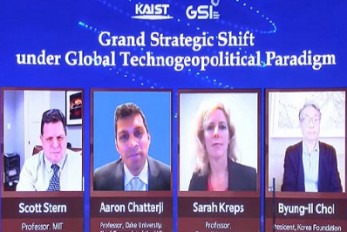
GSI Forum Highlights Global Collaboration Toward a Sustainab..
The forum stresses global collaboration to make the global value chain more resilient < Director So Young Kim at the Korea Policy Center for the 4IR (far left) facilitates the first session. Vice President for Planning and Budget Bowon Kim (far right) participated the session as the discussant. > Speakers at the 5th Global Strategy Institute International Forum on October 28 stressed the importance of global collaboration for rebuilding the global economy and making innovations in national science and technology governance in order to enhance national competitiveness. The forum entitled “Grand Strategic Shift under Global Techno-Geopolitical Paradigm” examined strategies for making the global supply chain more resilient and rebuild the global economy as well as how Korea could advance in the technology race. Speakers concurred that technology has become an issue of national security. The global supply chain has been disrupted amid the global pandemic and intense conflict between the U.S. and China. Speakers presented a common solution: global collaboration and innovations in science and technology governance. KAIST President Kwang Hyung Lee said in his opening remarks that the future ‘world map’ may turn out very differently depending on how we prepare and what we envision for the future. He also stressed the importance of technology sovereignty, adding that only those who can create their own new technology independently will be the future leaders. Prime Minister Boo Kyum Kim and Vice Minister of Science and ICT Hongtaek Yong delivered congratulatory remarks. Keynote speakers included Professor Scott Stern from the MIT Sloan School of Management, Professor Aaron Chatterji from the Fuqua School of Business at Duke University, Professor Sarah Kreps from the Department of Government at Cornell University, SK Group Chairperson Tae-Won Chey, President Woo Il Lee of the Korean Federation of Science and Technology Societies, Professor Young Kwan Yoon at Seoul National University, President Eun Mee Kim of Ewha Womans University, and President Ieehwan Kim of the University of Science and Technology. During the first session, Professor Chatterji stressed that how to make supply chains resilience will be the key for making long-term strategy with relevant government policy. He said that AI has become a general purpose technology (GPT) and Korea ranked 4th in AI innovation in the world, but how to translate this innovativeness into national strategic leadership will be a new challenge for Korea. He suggested that Korea strengthen its strategic partnerships with allies such as the U.S. and provide opportunities not only for established players but start-ups and entrepreneurs. Meanwhile, Professor Kreps said that industrial policy should also leverage trust and innovations for building technology alliances with a more longer-term approach, without antagonizing certain groups of nations. Vice President for Planning and Budget Bowon Kim who joined the forum as a discussant pointed out that in this hyper-connected era, nothing can be manufactured in a single company and country without the global supply chain. “In longer-term policy and strategies, we should embrace China as a global economy partner and include all nations around the world.” Chairman Chey from SK said that the clear role among universities, industry, and the government doesn’t exist any longer. Now, universities are working hard for the commercialization of technology from their labs. Industry is nurturing the talents inept for future industry, and the government is trying to introduce a more private-sector approach. As such, universities, the government, and industry should embrace all-inclusive approaches encompassing global politics and trade to lead on the global stage. Meanwhile in the second session, all of the speakers stressed innovation in science and technology governance in order to adopt to the new industrial paradigm. They agreed to make prompt innovations and solid collaborative systems among the government ministries to ensure national competitiveness, especially in the field of science and technology. President Lee from KOFST said Korea should adopt a first mover strategy and the government should adopt a mission-oriented projects and deregulate more. He pointed out that when mandating more autonomy in decision making, scientists and students can make more creative outcomes. Professor Yoon at SNU stressed the close alliance with the U.S. in the technology race, but suggested that Korea should also seek ways to help minimize the technology gap between advanced and developing countries. Universities should also be allowed more autonomy in running creative curriculum and academic affairs to in order boost the competitiveness of science and technology. President Kim from Ewha pointed out the role of education as a public good. In some countries, strengthening science and technology can be accomplished with wider educational opportunities in middle and high schools. President Kim also stressed expanding strategic partnerships. She said Korea should expand its alliances and partnerships, not only with the U.S. but with European countries and other niche countries where certain technologies are superior. President Kim of UST stressed a new science and technology leadership is required to build technology sovereignty and the government should spearhead the deregulations of the government policy. This GSI forum was co-hosted by two think-tanks at KAIST, the Korea Policy Center for the Fourth Industrial Revolution (KPC4IR) and the Innovation Strategy and Policy Institute (ISPI).
-
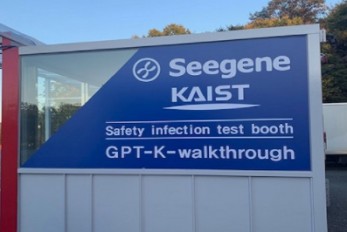
Seegene Opens Covid-19 Testing Mobile Station on Campus
Seegene donates testing reagents for 40,000 people with results available in three hours < Any KAIST community member can get a Covid-19 test on campus and receive the results within three hours at the Mobile Station develped by Seegene. > Seegene, a molecular diagnostic testing company, donated enough testing reagents for 40,000 COVID-19 tests for the KAIST community and set up a mobile testing station run by the Seegene Medical Foundation on October 28. The entire COVID-19 diagnosis process, including specimen collection, PCR testing, and results analysis, can be conducted at the mobile testing unit developed by Seegene. The on-site testing station will help the campus get ready to return to normal, especially as the government is transitioning toward its ‘living with Covid-19’ policy, which eases a range of social distancing restrictions. Any KAIST community member can get a Covid-19 test on campus and receive the results within three hours. The station can conduct up to 7,500 tests per day. This is an extension of the agreement between KAIST and Seegene made in July for research collaboration. The two institutions will work together on various research projects including ultrafast PCR testing, sample collection, and cloud-based data transmission and analysis. Prior to this donation, according to an administrative order from Daejeon City, KAIST opened a temporary COVID-19 testing center in collaboration with Seegene and conducted COVID-19 tests at the KAIST Clinic over four days starting from September 28. All students living on campus were tested, and all 2,775 tested negative. Seegene CEO Jong-Yoon Chun said, "KAIST and Seegene signed an agreement for collaborative research on molecular diagnosis in July prior to this donation, and we are happy to maintain a connection with KAIST.” He added, “We hope that this donation will help students return to their ordinary university lives.” Vice President for Planning and Budget Bowon Kim said, "As KAIST is currently planning to conduct offline lectures in preparation for ‘living with COVID-19’, Seegene’s donation will be particularly helpful.” He added, “The two institutions will continue to cooperate, leading to not only the short-term stabilization of the campus, but also collaborative research for the vitalization of molecular diagnosis technology and the bio industry.” < Seegene CEO Jong-Yoon Chun (far left), President Kwang Hyung Lee, and Seegene Medical Foundation Chairman Jong-Ki Chun pose after donation ceremony on Oct.28 at the campus. >
-
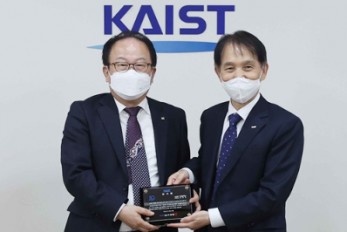
Hubo Professor Jun-Ho Oh Donates Startup Shares Worth 5 Bill..
Rainbow Robotics stock used to endow the development fund < Professor Oh and Hubo > Emeritus Professor Jun-Ho Oh, who developed the 2015 DARPA Challenge winning humanoid robot DRC-Hubo, donated 5 billion KRW on October 25 during a ceremony held at the KAIST campus in Daejeon. Professor Oh donated his 20% share (400 shares) of his startup Rainbow Robotics, which was established in 2011. Rainbow Robotics was listed on the KOSDAQ this February. The 400 shares were converted to 200,000 shares with a value of approximately 5 billion KRW when listed this year. KAIST sold the stocks and endowed the Jun-Ho Oh Fund, which will be used for the development of the university. He was the 39th faculty member who launched a startup with technology from his lab and became the biggest faculty entrepreneur donor. “I have received huge support and funding for my research. Fortunately, the research had a good result and led to the startup. Now I am very delighted to pay back the university. I feel that I have played a part in building the school’s startup ecosystem and creating a virtuous circle,” said Professor Oh during the ceremony. KAIST President Kwang Hyung Lee declared, “Professor Oh has been a very impressive exemplary model for our aspiring faculty and student tech startups. We will spare no effort to support startups at KAIST.” Professor Oh, who retired from the Department of Mechanical Engineering last year, now serves as the CTO at Rainbow Robotics. The company is developing humanoid bipedal robots and collaborative robots, and advancing robot technology including parts for astronomical observations. Professor Hae-Won Park and Professor Je Min Hwangbo, who are now responsible for the Hubo Lab, also joined the ceremony along with employees of Rainbow Robotics. < President Lee poses (right) poses with Professor Oh during the donation ceremony on October 25. >

